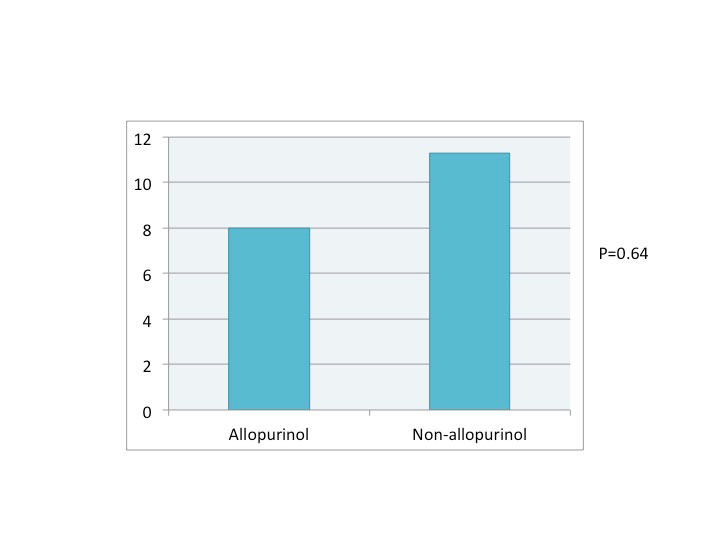Session Information
Session Type: Poster Session (Sunday)
Session Time: 9:00AM-11:00AM
Background/Purpose: Several studies implicate gout and/or xanthine oxidase activity as risk factors for type 2 diabetes. However, no studies have directly evaluated the effect of the xanthine oxidase inhibition on type 2 diabetes development. We therefore assessed the impact of allopurinol use on diabetes incidence in a retrospective cohort study of Veterans’ Affairs patients with gout.
Methods: The New York Harbor VA Computerized Patient Record System was searched to identify patients with an ICD-9 code for gout also meeting at least 4 1977 American Rheumatology Association gout diagnostic criteria. Pharmacy records were reviewed, and subjects divided into subgroups based on >30 continuous days of allopurinol prescription, versus no allopurinol. Incident diagnoses of diabetes, defined as first hemoglobin A1c ≥ 6.5% or physician documentation, were identified during an observation period from January 1, 2000 through December 31, 2015. Categorical variables, including the primary endpoint, were analyzed utilizing Fisher’s exact test. Continuous variables were analyzed using binomial regression and the Student’s T test.
Results: 1032 subjects were allopurinol users, and 485 subjects were allopurinol never-users. The average duration of allopurinol use was 48.4 months. There were significantly more Black subjects in the allopurinol group, whereas there were significantly more Asian subjects and subjects with chronic kidney disease in the non-allopurinol group. Over a mean 94.3 months of follow-up, there was no significant difference in diabetes incidence between the allopurinol and non-allopurinol groups (8.0/1000 person-years versus 11.3/1000 person-years, p=0.64). There was also no significant difference in diabetes incidence when subjects were analyzed by baseline serum urate level, colchicine use, allopurinol dose, extent of urate lowering with allopurinol or achieving target urate level. When stratified into quartiles by duration of allopurinol use, a significant difference was observed between diabetes incidence in the longest and shortest quartiles among subjects in the allopurinol cohort (7.3 per 1000 person-years versus 21.3 per 1000 person-years, p=0.007).
Conclusion: In this study, allopurinol use was overall not associated with reduced diabetes incidence, but longer durations of allopurinol use may have been associated with decreased diabetes. Prospective studies may further elucidate the relationship between hyperuricemia, gout, xanthine oxidase activity and diabetes, and the potential impact of gout treatments on diabetes incidence.
To cite this abstract in AMA style:
Slobodnick A, Toprover M, Pike C, Crittenden D, Greenberg J, Pillinger M. Allopurinol Use and Type 2 Diabetes Incidence Among Patients with Gout: A VA Cohort Study [abstract]. Arthritis Rheumatol. 2019; 71 (suppl 10). https://acrabstracts.org/abstract/allopurinol-use-and-type-2-diabetes-incidence-among-patients-with-gout-a-va-cohort-study/. Accessed .« Back to 2019 ACR/ARP Annual Meeting
ACR Meeting Abstracts - https://acrabstracts.org/abstract/allopurinol-use-and-type-2-diabetes-incidence-among-patients-with-gout-a-va-cohort-study/


